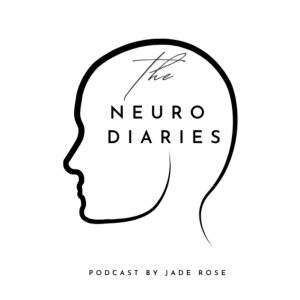
Tuesday Aug 06, 2024
Ep 1 - Bipolar 2 with Jade Rose
In this episode, Jade Rose shares her own story of living with bipolar II disorder. She discusses her background, daily life, and the symptoms she experiences during depressive and hypomanic episodes. She emphasizes the importance of understanding and accepting one's diagnosis and accessing appropriate treatment and support. Jade Rose shares her experience living with bipolar II and discusses the challenges and strategies she has developed to manage her condition. She emphasizes the importance of self-care, routine, and medication in maintaining stability. Jade also discusses the stigma surrounding mental health conditions and the decision to disclose her diagnosis. She highlights the need for understanding, curiosity, and empathy from others when sharing her diagnosis. Jade shares her desire for more open conversations about mental health in the workplace and the importance of flexibility and support for neurodivergent individuals. She concludes by expressing the positive aspects of living with bipolar II, such as creativity and inspiration, while acknowledging the difficulties of depressive episodes and the lack of control over the condition.
Keywords
Neurodiaries podcast, mental health, bipolar II disorder, diagnosis, symptoms, daily life, treatment, support, bipolar II, self-care, routine, medication, stigma, disclosure, understanding, empathy, workplace accommodations, flexibility, mental health conversations
Takeaways
- Bipolar II disorder is characterized by extreme highs and lows, with little control over when and how these episodes occur.
- Symptoms of depression in bipolar II can include crying spells, slow thinking, confusion, and heightened sensitivity to external stimuli.
- Symptoms of hypomania in bipolar II can include racing thoughts, insomnia, irritability, and impulsive behavior.
- Getting a diagnosis of bipolar II can provide clarity and help individuals access appropriate treatment and support.
- Therapeutic interventions such as cognitive behavioral therapy and lifestyle management can be beneficial for managing bipolar II.
- Understanding and accepting one's diagnosis is crucial for self-care and mental well-being. Self-care, routine, and medication are essential for managing bipolar II.
- Disclosure of a mental health condition should be a personal choice based on the level of understanding and acceptance from others.
- Understanding, curiosity, and empathy are the best ways for others to respond when someone shares their diagnosis.
- Workplaces should prioritize mental wellbeing and provide flexibility and support for neurodivergent individuals.
- Open conversations about mental health can help reduce stigma and create a more accepting society.
- Living with bipolar II has both positive aspects, such as creativity and inspiration, and challenges, such as depressive episodes and lack of control
Comments (0)
To leave or reply to comments, please download free Podbean or
No Comments
To leave or reply to comments,
please download free Podbean App.